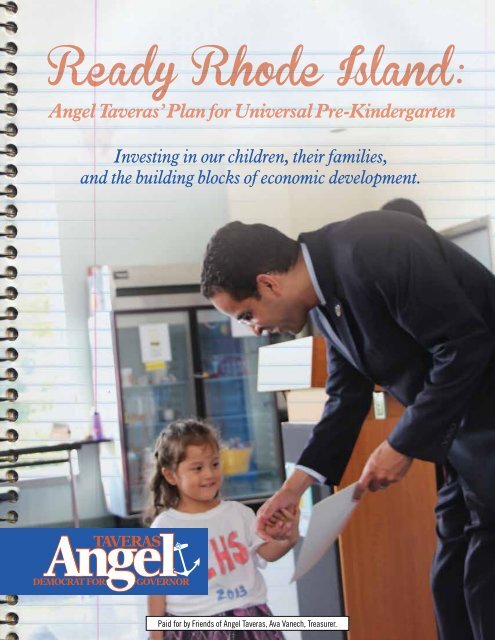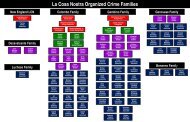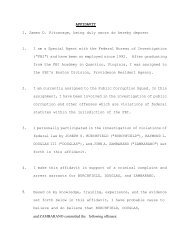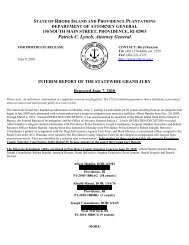Ready Rhode Island
Ready Rhode Island: - WPRI.com
Ready Rhode Island: - WPRI.com
- No tags were found...
Create successful ePaper yourself
Turn your PDF publications into a flip-book with our unique Google optimized e-Paper software.
<strong>Ready</strong> <strong>Rhode</strong> <strong>Island</strong>:<br />
Angel Taveras’ Plan for Universal Pre-Kindergarten<br />
Investing in our children, their families,<br />
and the building blocks of economic development.<br />
Paid for by Friends of Angel Taveras, Ava Vanech, Treasurer.
Dear <strong>Rhode</strong> <strong>Island</strong>ers,<br />
It brings me great pleasure today to release this policy report, “<strong>Ready</strong> <strong>Rhode</strong> <strong>Island</strong>.” This report is a roadmap<br />
for making <strong>Rhode</strong> <strong>Island</strong> a national leader in early childhood education. Specifically, this plan lays out<br />
our vision to achieve universal pre-kindergarten for all four-year-olds throughout the State of <strong>Rhode</strong> <strong>Island</strong>.<br />
This proposal is a building block for economic development. In fact, research has shown that prekindergarten<br />
graduates are more likely to attend college, attain a full time job, and have health insurance<br />
later in life. This is the first building block in a wider view of strengthening our economy, creating jobs, and<br />
investing in people. I look forward to continuing this conversation during my campaign for Governor.<br />
Like so many, I know firsthand the life-changing power of a transformative education. I often say that,<br />
growing up, I went from “Head Start to Harvard University,” and I did it through the Providence public school<br />
system. For me, it was the dedicated teachers that I had along the way – at Mary E. Fogarty Elementary<br />
School, Roger Williams Middle School, Nathanael Greene Middle School, and Classical High School – that<br />
made all the difference.<br />
As Mayor of the City of Providence, I have made improving educational outcomes and ensuring that all of our<br />
children have access to high-quality public schools my top priority. And while there is more work left to be<br />
done, I am proud of what we have accomplished in three short years. Our plan to raise the percentage of<br />
third graders who are proficient in reading by the end of third grade has earned Providence a designation by<br />
the National League of Cities as an “All American City.” Providence has been named one of the 100 Best<br />
Communities for Young People by the America’s Promise Alliance. And our work has been recognized by<br />
many organizations, including Bloomberg Philanthropies, the Annie E. Casey Foundation, the Nellie Mae<br />
Education Foundation, and even the White House. Thanks to the tireless work of many – educators, families,<br />
and community-based organizations – Providence is moving in the right direction.<br />
Research shows that supporting early childhood education is a direct investment in the building blocks of<br />
long-term economic development. Universal pre-kindergarten is a critically important first-step in<br />
strengthening <strong>Rhode</strong> <strong>Island</strong>’s cradle-to-career workforce development pipeline.<br />
As Governor, I will fight to make sure that all of <strong>Rhode</strong> <strong>Island</strong>’s young people – regardless of their family<br />
circumstances – have the same types of opportunities that I enjoyed. That’s a promise that starts right at the<br />
start, with universal pre-kindergarten.<br />
Together, I know we can make a difference for young people throughout <strong>Rhode</strong> <strong>Island</strong>.<br />
Sincerely yours,<br />
Mayor Angel Taveras<br />
Page 1 of 8<br />
Paid for and Authorized by Friends of Angel Taveras| Ava Vanech, Treasurer<br />
Printed In House
1. Why Early Childhood Education?<br />
Research has clearly documented the critically important role that<br />
early childhood education plays in the lives of young people, in their<br />
communities, and on important issues like workforce development<br />
and public safety. 1<br />
Studies show that participation in pre-kindergarten programs yield<br />
positive effects on children’s cognitive skills – helping young<br />
learners identify letters and pronounce words, solve problems, and<br />
develop their vocabularies. Children who participate in prekindergarten<br />
programs also develop important social, emotional,<br />
and behavioral skills that help them succeed in school in later<br />
years. 2<br />
“The longer society waits to<br />
intervene in the life cycle of a<br />
disadvantaged child, the more<br />
costly it is to remediate<br />
disadvantage.”<br />
-- James Heckman, University of<br />
Chicago<br />
Enrollment in high quality pre-kindergarten programs has economic benefits, too. A study by the<br />
National Institutes of Health found that pre-kindergarten graduates in Chicago were more likely to<br />
attend college, attain a full-time job, and have health insurance later in life. 3 Lifetime economic<br />
benefits on important outcomes like educational attainment, employment, and involvement in criminal<br />
justice and child welfare systems realized a return-on-investment of as much as $11 for each dollar<br />
invested. 4 A study of the long-term benefits of early education in <strong>Rhode</strong> <strong>Island</strong> specifically found a<br />
similar $8 per dollar invested return. 5<br />
Similar studies have documented positive returns-on-investment elsewhere. For example, in evaluating<br />
the potential impacts of a universal pre-kindergarten program in California, the RAND Corporation<br />
estimated a positive return of $2.62 in community benefits for every $1 of investment. According to<br />
Nobel Laureate and University of Chicago professor James J. Heckman, an investment in early childhood<br />
education that produced a 5% increase in male high school graduation rates could save <strong>Rhode</strong> <strong>Island</strong> $6<br />
million annually in costs associated with criminal justice alone. 6 Another study found that the program<br />
would start paying for itself within 9 years because of all these benefits. 7<br />
Both full-day kindergarten and high-quality pre-kindergarten are linked to positive life outcomes, future<br />
workforce productivity, and reduced costs. It is no surprise that a recent survey conducted by Public<br />
Opinion Strategies and Hart Research found that 89% of Americans say it is important to make early<br />
education and child care more affordable for working families. 8 Simply put, investments in early<br />
childhood education are among the best investments <strong>Rhode</strong> <strong>Island</strong> can make.<br />
1 “Return on Investment: Cost vs. Benefits ” Heckman University of Chicago<br />
2 “Kindergarten Matters ” Raj Chetty Harvard Magazine November-December 2010<br />
3 “The First Eight Years: Giving Kids a Foundation for Lifetime Success,” The Annie E. Casey Foundation, 11/4/2013<br />
4 “High-quality preschool program produces long-term economic payoff,” National Institute of Health, 2/4/2011<br />
5 “Enriching Children Enriching the Nation <strong>Rhode</strong> <strong>Island</strong> Summary ” Lynch Economic Policy Institute 7/9/2007<br />
6 “Invest in Early Childhood Development ” Heckman The Heckman Equation<br />
7 “Enriching Children, Enriching the Nation <strong>Rhode</strong> <strong>Island</strong> Summary,” Lynch, Economic Policy Institute, 7/9/2007<br />
8 “Early Childhood Education is a Top Priority for Voters, Second Only to Increasing Jobs and Economic Growth.”<br />
Page 2 of 8<br />
Paid for and Authorized by Friends of Angel Taveras| Ava Vanech, Treasurer<br />
Printed In House
2. Economic Development Begins in<br />
the Classroom<br />
As of October of 2013, <strong>Rhode</strong> <strong>Island</strong>’s<br />
unemployment rate remains at the unacceptably<br />
high level of 9.2%, now the second highest rate of<br />
unemployment in the nation. 9 Yet, according to<br />
Census data, <strong>Rhode</strong> <strong>Island</strong>ers without a high<br />
school diploma are up to four times more likely to<br />
be unemployed than <strong>Rhode</strong> <strong>Island</strong>ers with a<br />
Bachelor’s degree. 10 Similarly, Census data show<br />
that median earnings for <strong>Rhode</strong> <strong>Island</strong>ers<br />
possessing a Bachelor’s degree are more<br />
than twice as high as median earnings for<br />
<strong>Rhode</strong> <strong>Island</strong>ers who lack a high school<br />
diploma. 11<br />
A strong foundation in early childhood<br />
represents an important building block<br />
toward on-time high school graduation.<br />
For example, children who are not<br />
proficient in reading by the end of third<br />
grade can be up to four times less likely to<br />
graduate from high school on time. 12<br />
Children from low-income families who<br />
live in communities of concentrated<br />
poverty who are not proficient in reading<br />
by the end of third grade are thirty-five<br />
percent less likely to graduate from high<br />
school on time. 13<br />
$80,000<br />
$70,000<br />
$60,000<br />
$50,000<br />
$40,000<br />
$30,000<br />
$20,000<br />
$10,000<br />
$0<br />
20%<br />
15%<br />
10%<br />
5%<br />
0%<br />
Unemployment Rate by Education<br />
Level: <strong>Rhode</strong> <strong>Island</strong>, 2010-2012<br />
Less than high<br />
school<br />
Less than High school<br />
high school diploma<br />
High school<br />
diploma<br />
Some<br />
college or<br />
Associate's<br />
degree<br />
Some college<br />
or Associate's<br />
degree<br />
Median Earnings by Education Level,<br />
<strong>Rhode</strong> <strong>Island</strong>, 2010-2012<br />
Bachelor's<br />
Degree<br />
Bachelor's<br />
Degree or<br />
higher<br />
Graduate or<br />
Professional<br />
Degree<br />
Source: U.S. Census Bureau, American Community Survey. Adapted from <strong>Rhode</strong><br />
<strong>Island</strong> KIDS COUNT Issue Brief: Improving High School Graduation Rates in <strong>Rhode</strong><br />
<strong>Island</strong>, November 2013<br />
As Mayor of the City of Providence, I have maintained a strong focus on raising the percentage of third<br />
grade students who are reading at grade level. For example, our plan to boost the school readiness of<br />
incoming kindergarten students won the $5 million grand prize in Bloomberg Philanthropies’ inaugural<br />
Mayor’s Challenge. Achieving universal pre-kindergarten will significantly strengthen <strong>Rhode</strong> <strong>Island</strong>’s<br />
cradle-to-career pipeline, helping to ensure that all of <strong>Rhode</strong> <strong>Island</strong>’s young people, regardless of family<br />
circumstance, have the opportunity to enter school ready to learn, graduate on-time, and succeed in<br />
their chosen career.<br />
9 Bureau of Labor Statistics, Unemployment Rates for States Monthly Rankings Seasonally Adjusted, October 2013<br />
10 Issue Brief: Improving High School Graduation Rates in <strong>Rhode</strong> <strong>Island</strong>, November 2013<br />
11 Issue Brief: Improving High School Graduation Rates in <strong>Rhode</strong> <strong>Island</strong>, November 2013<br />
12 "The Vital Link: Early Childhood Investment is the First Step to High School Graduation,” <strong>Ready</strong>Nation, September 2013<br />
13 “The Vital Link: Early Childhood Investment is the First Step to High School Graduation,” <strong>Ready</strong>Nation, September 2013<br />
Page 3 of 8<br />
Paid for and Authorized by Friends of Angel Taveras| Ava Vanech, Treasurer<br />
Printed In House
3. <strong>Rhode</strong> <strong>Island</strong> Early Childhood Education Today<br />
<strong>Rhode</strong> <strong>Island</strong>, like most states, maintains a publicly sponsored pre-kindergarten program. 14 <strong>Rhode</strong><br />
<strong>Island</strong>’s pre-kindergarten program was first launched in 2009 as a two-year demonstration project with<br />
seven classrooms in Central Falls, Providence, Warwick, and Woonsocket. This pilot was evaluated by<br />
the National Institute for Early Education Research (NIEER), which found that the program “closed the<br />
achievement gap by at least three fourths, with significant gains in children’s literacy and math<br />
scores.” 15 According to the NIEER, <strong>Rhode</strong> <strong>Island</strong> meets all 10 benchmarks for quality standards, meaning<br />
that our policies regarding issues like teacher certification, classroom sizes, and site monitoring are all<br />
best-in-class. 16 In 2010, funding for pre-kindergarten was included in the state’s new Education Funding<br />
Formula through categorical early childhood funding. The 2010 legislation included a ten-year phase-in<br />
of the pre-kindergarten program – adding an additional $1 million per year, until reaching approximately<br />
1,000 students by 2020.<br />
70%<br />
60%<br />
50%<br />
40%<br />
30%<br />
20%<br />
10%<br />
0%<br />
Percentage of eligible 4-year-olds enrolled in state prekindergarten<br />
program (northeast states)<br />
2010 2011 2012<br />
Source: The State of Preschool 2012, National Institute for Early Education Research (NIEER), Barnett, W. Steven, Megan E.<br />
Carolan, Jen Fitzgerald, James Squires, 2012. Rutgers Graduate School of Education. Note that New Hampshire maintains no<br />
state pre-kindergarten program.<br />
<strong>Rhode</strong> <strong>Island</strong>’s pre-kindergarten program is high quality, but limited in access. Only approximately 1% of<br />
<strong>Rhode</strong> <strong>Island</strong> four-year-olds are enrolled in state-financed preschool programs 17 , compared to highs of<br />
14 R.I. Department of Education Pre-K Program<br />
15 “Elizabeth Burke Bryant Executive Director <strong>Rhode</strong> <strong>Island</strong> KIDS COUNT Testimony before House Finance Committee ” 3/15/2012<br />
16 “The State of Preschool 2012,” <strong>Rhode</strong> <strong>Island</strong>, National Institute for Early Education Research, Page 121<br />
17 “The State of Preschool 2012,” <strong>Rhode</strong> <strong>Island</strong>, National Institute for Early Education Research<br />
Page 4 of 8<br />
Paid for and Authorized by Friends of Angel Taveras| Ava Vanech, Treasurer<br />
Printed In House
74% in Oklahoma 18 and 65% in Vermont. 19 In neighboring Massachusetts,<br />
the percentage of four-year-olds in state-financed pre-kindergarten<br />
programs is 14% 20 and in neighboring Connecticut that percentage is<br />
13%. 21 Nationally, about 28% of all four-year-olds are enrolled in statefinanced<br />
pre-kindergarten programs. 22 In fact, according to the National<br />
Institute for Early Education Research, <strong>Rhode</strong> <strong>Island</strong> has the lowest<br />
percentage of four-year-old children enrolled in state pre-kindergarten of<br />
any state in the nation with a state sponsored pre-kindergarten<br />
program. 23<br />
Compounding these problems is a lack of access to full-day kindergarten in<br />
<strong>Rhode</strong> <strong>Island</strong> communities. In the 2012-2013 school year, only 68% <strong>Rhode</strong><br />
<strong>Island</strong>’s children were enrolled in full-day kindergarten. 24 This number lags<br />
the national average of 77%. 25<br />
“High-quality early childhood<br />
education programs are<br />
among the most costeffective<br />
educational<br />
interventions and are likely to<br />
be profitable investments for<br />
society as a whole.”<br />
--- Society for Research in<br />
Child Development<br />
4. The Plan<br />
I have a three-step plan to make <strong>Rhode</strong> <strong>Island</strong> a national leader in early childhood education.<br />
• Achieve Universal Pre-Kindergarten for all <strong>Rhode</strong> <strong>Island</strong>ers: In Fiscal Year 2014, <strong>Rhode</strong> <strong>Island</strong> spent<br />
$2.45 million on its state-funded pre-kindergarten program for children without special needs –<br />
serving only 252 children in 14 classrooms. 26<br />
About 10,800 students are enrolled in public first grade 27 , and we can expect a similar number of<br />
enrollees in Pre-K. Subtracting the number of students enrolled in Head Start 28 and Preschool<br />
Special Education 29 implies that approximately 5,200 children can benefit from state sponsored prekindergarten.<br />
As Governor, I will expand pre-kindergarten so that every family who wants to can send their child<br />
to pre-kindergarten within eight years. We will start by creating slots for 2,650 children to enroll<br />
in a high-quality, full-day pre-kindergarten program. Accounting for the percentage of <strong>Rhode</strong><br />
<strong>Island</strong> four-year-olds already served by another public program, <strong>Rhode</strong> <strong>Island</strong> would achieve a 76%<br />
18 “The State of Preschool 2012,” Oklahoma, National Institute for Early Education Research<br />
19 “Figure 1: Percent of 4-Year Olds Served in State Pre-K,” “The State of Preschool 2012,” <strong>Rhode</strong> <strong>Island</strong>, National Institute for Early Education<br />
Research<br />
20 “The State of Preschool 2012,” Massachusetts, National Institute for Early Education Research<br />
21 “The State of Preschool 2012,” Connecticut, National Institute for Early Education Research<br />
22 “The State of Preschool 2012,” United States, National Institute for Early Education Research<br />
23 “The State of Preschool 2011,” National Institute for Early Education Research Based on 2010-2011 data.<br />
24 “2013 <strong>Rhode</strong> <strong>Island</strong> KIDS COUNT ” Kids Count. Note that this number excludes children enrolled in private kindergarten programs.<br />
25 “2013 <strong>Rhode</strong> <strong>Island</strong> KIDS COUNT ” Kids Count. Note that this number excludes children enrolled in private kindergarten programs.<br />
26 “Elizabeth Burke Bryant, Executive Director <strong>Rhode</strong> <strong>Island</strong> KIDS COUNT Testimony before House Finance Committee,” 3/15/2012<br />
27 “October Enrollment 2013-2014 ” <strong>Rhode</strong> <strong>Island</strong> Department of Education<br />
28 “Head Start Program Facts Fiscal Year 2012,” Department of Health & Human Services, FY2012<br />
29 Issue Brief: Young Children with Developmental Delays & Disabilities<br />
Page 5 of 8<br />
Paid for and Authorized by Friends of Angel Taveras| Ava Vanech, Treasurer<br />
Printed In House
pre-kindergarten enrollment rate, among the highest in the nation. 30 Communities with a high<br />
proportion of children eligible for free and reduced priced lunch will receive a preference in the<br />
accelerated phase-in of this plan.<br />
• Maintain focus on high-quality standards: As noted above, <strong>Rhode</strong> <strong>Island</strong> maintains the highest<br />
quality standards for pre-kindergarten programming. In fact, <strong>Rhode</strong> <strong>Island</strong> was one of only four<br />
states nationally to meet all quality standards in NIEER’s 2012 State of Pre-school Report. 31 Moving<br />
forward, we must not sacrifice quality programming for greater access. <strong>Ready</strong> <strong>Rhode</strong> <strong>Island</strong> will<br />
ensure that state pre-kindergarten teachers maintain a bachelor’s degree with an early childhood<br />
teaching certificate, that classroom ratios are no higher than 18 students per teacher, and that prekindergarten<br />
sites remain regularly monitored by content experts.<br />
• Achieve statewide full-day kindergarten: Full-day kindergarten gives educators more time to<br />
introduce young people to key concepts in mathematics, science and literacy. It also gives working<br />
families peace of mind and flexibility with childcare during the working day. Yet today, students<br />
across our state, from Barrington to Woonsocket, lack access to full day kindergarten. As Governor,<br />
I will ensure that the Full-Day Kindergarten Accessibility Act is fully funded, allowing for one-time<br />
planning and implementation grants to all <strong>Rhode</strong> <strong>Island</strong> school districts transitioning to full-day<br />
kindergarten. 32 Research has demonstrated that transitioning to full-day kindergarten can save<br />
districts millions of dollars in reducing the costs of students who repeat grades. 33 As Governor, I will<br />
ensure that <strong>Rhode</strong> <strong>Island</strong> joins states like Delaware and Maryland in ensuring that all children have<br />
access to full-day kindergarten.<br />
5. Paying for <strong>Ready</strong> <strong>Rhode</strong> <strong>Island</strong><br />
As Mayor of Providence I have demonstrated that I know how to set priorities and make tough budget<br />
decisions. Together we have eliminated a $110 million structural budget deficit in Providence 34 and<br />
turned it into a surplus. 35 While <strong>Rhode</strong> <strong>Island</strong> too faces a difficult budget situation, I am confident that<br />
by applying the same discipline we did in Providence we will find the resources needed for universal prekindergarten.<br />
FY 2016 FY 2017 FY 2018 FY 2019<br />
Pre-Kindergarten Seats 700 1,350 2,000 2,650<br />
Estimated Cost 36 $6,510,000 $12,555,000 $18,600,000 $24,645,000<br />
Investments in early childhood education are investments that pay for themselves over time. A study by<br />
the Economic Policy Institute found that a voluntary, universal pre-kindergarten program in <strong>Rhode</strong><br />
30 “The State of Preschool 2011 ” National Institute for Early Education Research Based on 2010-2011 data.<br />
31 “The State of Preschool 2012,” United States, National Institute for Early Education Research<br />
32 “Issue Brief: Improving Access to High-Quality Early Learning Programs in <strong>Rhode</strong> <strong>Island</strong>”<br />
33 Study: Full-Day Kindergarten Boosts Academic Performance ” Education Week.<br />
34 “Providence faces $180M deficit this year and next,” Associated Press State and Local Wire, 3/2/2011<br />
35 “Providence back in the black: Officials project slight surplus,” Smith, Providence Journal, 11/9/2013<br />
36 Based on $9,300/pupil funding.<br />
Page 6 of 8<br />
Paid for and Authorized by Friends of Angel Taveras| Ava Vanech, Treasurer<br />
Printed In House
<strong>Island</strong> would pay for itself in less than ten years and would generate benefits of $8 dollars for each dollar<br />
invested. Economist James J. Heckman, as noted earlier, has<br />
estimated that an investment in early childhood education that<br />
produced a 5% increase in male high school graduation rates could<br />
save <strong>Rhode</strong> <strong>Island</strong> $6 million annually in costs associated with criminal<br />
justice alone. 37<br />
The cost of this proposal constitutes less than 1% of the <strong>Rhode</strong> <strong>Island</strong>’s<br />
current spending on education, and less than half of one percent of<br />
total state spending.<br />
The cost of this proposal<br />
constitutes less than 1% of<br />
<strong>Rhode</strong> <strong>Island</strong>’s current<br />
spending on education, and<br />
less than half of one percent<br />
of total state spending.<br />
To offset the costs of the expansion of both full-day kindergarten and universal pre-kindergarten, my<br />
administration:<br />
• Will partner with individual school districts willing to commit existing Federal Title 1 dollars to<br />
these early childhood programs.<br />
• Will aggressively seek federal and private foundation funding for this critical initiative: the<br />
recently proposed Strong Start for America’s Children Act of 2013, for example, would establish<br />
America’s first federal formula for locally provided high-quality, pre-kindergarten.<br />
• Will reduce the number of young people at the <strong>Rhode</strong> <strong>Island</strong> Training School and invest in costeffective<br />
alternative treatments like Drug Courts that are proven to reduce crime and save<br />
millions. 38<br />
I am confident from my experience as Mayor of Providence that as Governor, I will be able to identify<br />
the savings and efficiencies necessary to allow us to reallocate existing resources to important<br />
investments like early childhood education. For example-<br />
• The state of <strong>Rhode</strong> <strong>Island</strong> spends tens of millions of dollars a year on personnel overtime costs, a<br />
large portion of which occurs at state hospitals and prisons. 39 As Mayor, I know that overtime<br />
costs can be a penny wise and a pound foolish. My administration will reduce overtime costs<br />
through smarter, more streamlined staffing strategies at state institutions.<br />
• My administration will competitively bid contracts for vehicle fleet maintenance, an overdue<br />
reform that has the potential to save <strong>Rhode</strong> <strong>Island</strong> millions of dollars.<br />
37 “Invest in Early Childhood Development ” Heckman The Heckman Equation<br />
38 Drug Courts: Saving Money, Cutting Crime, Serving Veterans” National Association of Drug Court Professionals<br />
39 “Social programs, overtime pushing R.I. beyond its budget,” Providence Journal, November, 2013.<br />
Page 7 of 8<br />
Paid for and Authorized by Friends of Angel Taveras| Ava Vanech, Treasurer<br />
Printed In House
6. The Bottom Line<br />
Research has demonstrated the life-changing power of high-quality early education programming. We<br />
need to be committed to the priority of investing in our young people. In addition, this program will<br />
make <strong>Rhode</strong> <strong>Island</strong> more competitive when the state is attracting employers to relocate. Quality of life<br />
and education are two of the most important factors companies consider when deciding where to<br />
relocate.<br />
Moreover, educating our children earlier with high quality standards will pay dividends in our economic<br />
future. This investment will help create a more diverse, robust, vibrant, and equitable economic future<br />
for all <strong>Rhode</strong> <strong>Island</strong>ers. Our state government can effectively invest in <strong>Rhode</strong> <strong>Island</strong> families.<br />
Yet while <strong>Rhode</strong> <strong>Island</strong> maintains a high-quality state pre-kindergarten program, access is limited to a<br />
lucky few. As Governor, I will achieve universal pre-kindergarten in our state, serving half of all eligible<br />
children by the end of my first term in office. We won’t sacrifice quality, and we will expand full-day<br />
kindergarten at the same time.<br />
Together, we can make a difference for young people throughout our State.<br />
www.Angel2014.com<br />
401-862-3854<br />
PO Box 2533<br />
Providence, RI 02906<br />
Angel@Angel2014.com<br />
Page 8 of 8<br />
Paid for and Authorized by Friends of Angel Taveras| Ava Vanech, Treasurer<br />
Printed In House








